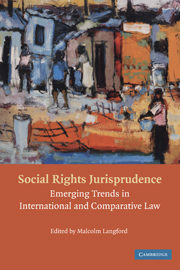Book contents
- Frontmatter
- Contents
- Foreword – Philip Alston
- Preface
- PART ONE OVERVIEW
- PART TWO SELECT NATIONAL JURISDICTIONS
- PART THREE REGIONAL PROCEDURES AND JURISPRUDENCE
- PART FOUR INTERNATIONAL HUMAN RIGHTS PROCEDURES AND JURISPRUDENCE
- 23 Committee on Economic, Social and Cultural Rights
- 24 Committee on the Elimination of Racial Discrimination
- 25 Human Rights Committee
- 26 Committee on the Elimination of Discrimination Against Women
- 27 Committee on the Rights of the Child
- PART FIVE SPECIAL TOPICS
- Notes on Contributors
- Table of Authorities
- Index
- References
25 - Human Rights Committee
Not Only a Committee on Civil and Political Rights
Published online by Cambridge University Press: 05 June 2012
- Frontmatter
- Contents
- Foreword – Philip Alston
- Preface
- PART ONE OVERVIEW
- PART TWO SELECT NATIONAL JURISDICTIONS
- PART THREE REGIONAL PROCEDURES AND JURISPRUDENCE
- PART FOUR INTERNATIONAL HUMAN RIGHTS PROCEDURES AND JURISPRUDENCE
- 23 Committee on Economic, Social and Cultural Rights
- 24 Committee on the Elimination of Racial Discrimination
- 25 Human Rights Committee
- 26 Committee on the Elimination of Discrimination Against Women
- 27 Committee on the Rights of the Child
- PART FIVE SPECIAL TOPICS
- Notes on Contributors
- Table of Authorities
- Index
- References
Summary
INTRODUCTION
There is no water-tight division between different categories of human rights. In particular, it is important to note that although the project of transforming the 1948 Universal Declaration of Human Rights into treaty form culminated in separate Covenants including, on the one hand, civil and political Rights and, on the other hand, economic, social and cultural Rights, it did not result in complete compartmentalisation of those two categories of human rights. On the contrary, there is both interdependence between different human rights and direct overlap between the two Covenants.
The operation of the Human Rights Committee, the expert body established under the Covenant on Civil and Political Rights (‘ICCPR’), has provided ample evidence of such interdependence and overlap. The International Covenant on Civil and Political Rights is not a treaty on economic, social and cultural rights but neither is it a treaty solely on civil and political rights. There is considerable similarity between the two Covenants of 1966, so that for instance ICCPR Articles 1 (self-determination), 18 (freedom of thought, conscience and religion, including in the domain of education), 22 (freedom of association, including the right to join and form trade unions) and 27 (minority rights, including the right to enjoy one's own culture) even textually refer to economic, social or cultural rights. In addition, the freestanding non-discrimination provision in Article 26 opens up possibilities for claims related to social security benefits and many other economic, social and cultural rights.
- Type
- Chapter
- Information
- Social Rights JurisprudenceEmerging Trends in International and Comparative Law, pp. 540 - 552Publisher: Cambridge University PressPrint publication year: 2009



